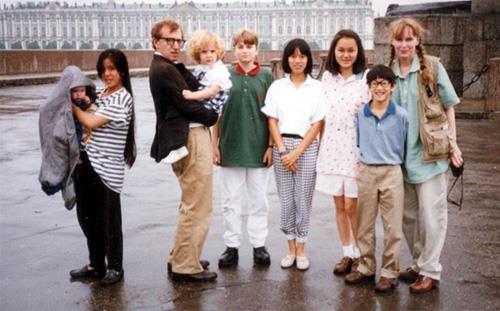
Not unlike a number of other men in this world, Woody Allen's attitude toward kids changed when he got his first chance to actually hang around with them.
He had always been so absorbed in his work, primarily as a filmmaker, that he had "zero interest" in adding children to his life.
But once he got into a relationship with Mia Farrow, who had a battalion of kids and wanted more, he found they could be surprisingly interesting and fun.
That evolution in Allen's parental attitude seems to be one of the few points on which Allen and Farrow agree these days, based on the new four-part documentary Allen v. Farrow, which premieres Sunday at 9 p.m. ET on HBO and continues for the next three Sundays in the same time slot.
As everyone who remembers the sordid and sad final scenes of the Allen-Farrow relationship will fully expect, Allen v. Farrow does not focus on the happy summer days when Woody showed some of Mia's kids how to fish and or the times he flew them on private jets to exotic movie locations around the world.
Rather it revisits the two most sensational flashpoints of their breakup: secondarily the fact that Allen secretly began a relationship with Mia's young adopted daughter Soon-Yi, and primarily the allegation that Allen molested her even younger daughter, Dylan.
Its tone tends more toward reportorial than sensational – thank the Lord for small favors – though the ominous and largely monotonal background music underscores the fact that the subject matter runs unavoidably dark.
Allen has said there was nothing inappropriate about the marriage and has consistently denied that he ever molested Dylan, charging that Farrow coached Dylan into making up that story as revenge for what Farrow saw as his betrayal with Soon-Yi.
Over the subsequent three decades, much of Allen's reputation survived all this. He has continued to make movies and while some performers have declined to work with him, others continue to do so. When his autobiography Apropos of Nothing was cancelled by its original publisher, it came out under another imprint.
Farrow, meanwhile, largely disappeared from public view, leaving her once-busy acting career behind. Her family, including the children, have split into camps, with her journalist son, Ronan, joining Farrow and Dylan in denouncing Allen while her son Moses has defended him.
Allen v. Farrow includes arguments from both positions, which is not to say it's a 50-50 split. From the outset, it is more a forum for Farrow's side, with Dylan as its centerpiece and new interviews from Farrow and Ronan, as well as several of Farrow's longtime family friends.
Allen declined to participate, as did Soon-Yi and most of his other friends and allies. His voice is heard mostly in excerpts from Apropos of Nothing, for which he read the audio book. He addresses many of the same points and issues as Farrow, Dylan, and the others.
Filmmakers Amy Herdy, Amy Zierling, and Kirby Dick have said they included as much balance as they could find. At the same time, they have described Allen v. Farrow as a vehicle for Farrow's side of the story, which they say has long been steamrolled by Allen's public relations machine.
Besides the he said/she said, the documentary includes source material like taped phone conversations between Farrow and Allen after things started to fall apart. It also includes extensive home movies from happier times, since Farrow apparently was an obsessive parent videographer.
Perhaps the freshest part of the film is not the abuse allegations themselves, which are familiar albeit sobering, but the backstory between Allen and Dylan.
From the time she was brought home as an infant, he developed an attachment that bordered on obsession. He would separate her from the other children to do things just with her. He would cuddle up in bed with her. He would hang around when she was playing with her friends, to the extent that some of her friends say Dylan would sometimes want Daddy to go away.
Allen says Dylan, following Moses, became his favorite. That attachment, he says, had no sexual component.
Dylan says she now realizes she was torn, that she loved being the special one singled out for attention, but that she eventually realized there was something going on that was not quite right.
By the age of 5 she was seeing a therapist to deal with depression and anxiety. She reportedly told the therapist she had an unspecified "secret." Ronan says that by 7, when the abuse allegedly occurred, she had become withdrawn and visibly unhappy.
Allen also agreed to see a therapist, who reportedly said some of his behavior was not appropriate, but that there were no signs it involved sexual abuse.
In the end, the accusation/denial cycle lingers. As the whole case became public in the early 1990s, it's not likely the millions of civilians who followed it will ever know exactly what did or didn't happen.
Allen v. Farrow, as the title implies, gives us the Dylan testimony we would have heard if the case had been tried in a courtroom instead of the media. Her story is compelling and disturbing. And in the end, like most juries, we can only draw our conclusions based on what we can extrapolate from what the involved parties choose to share.